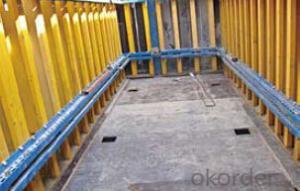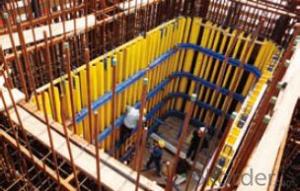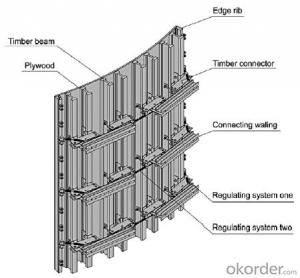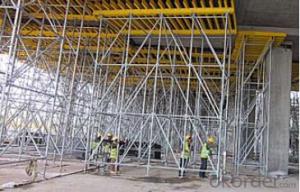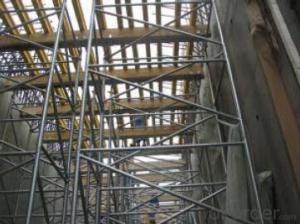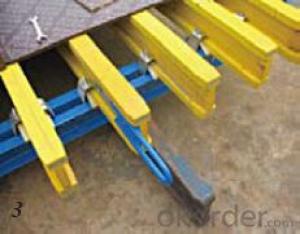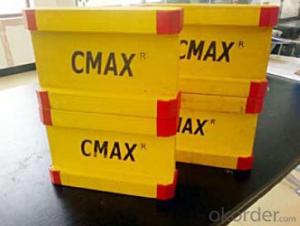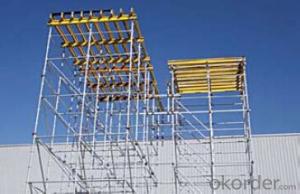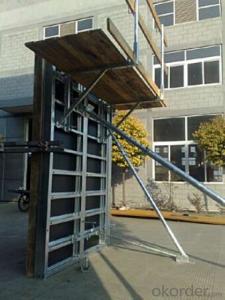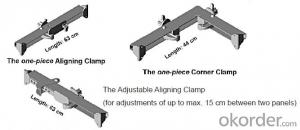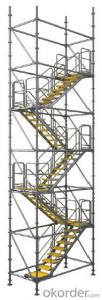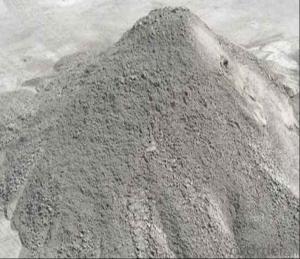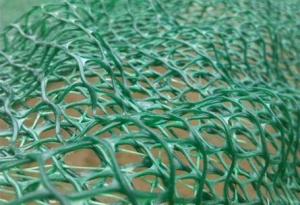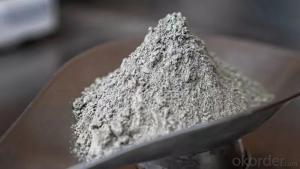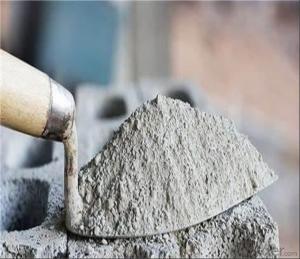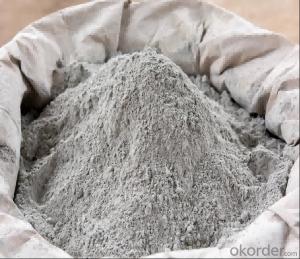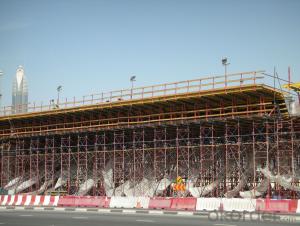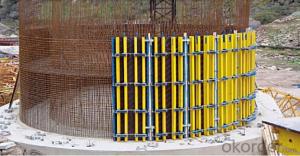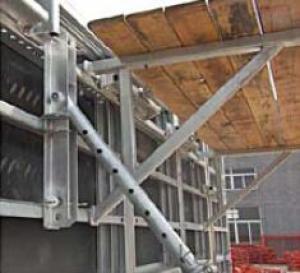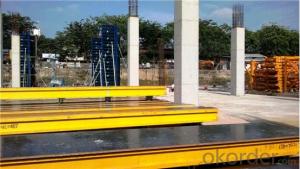Shaft Platform S40 System for Formwork and Scaffolding
- Loading Port:
- Tianjin
- Payment Terms:
- TT OR LC
- Min Order Qty:
- 50 m²
- Supply Capability:
- 1000 m²/month
OKorder Service Pledge
Quality Product, Order Online Tracking, Timely Delivery
OKorder Financial Service
Credit Rating, Credit Services, Credit Purchasing
You Might Also Like
Shaft Platform
As operating platform, the shaft platform is mainly used in the concrete pouring of elevator shaft,
equipment shaft, stair shaft of high-rise building and so on.
Characteristics:
◆ The length of shaft beam is adjustable.
◆ Flexible structure makes lifting easier.
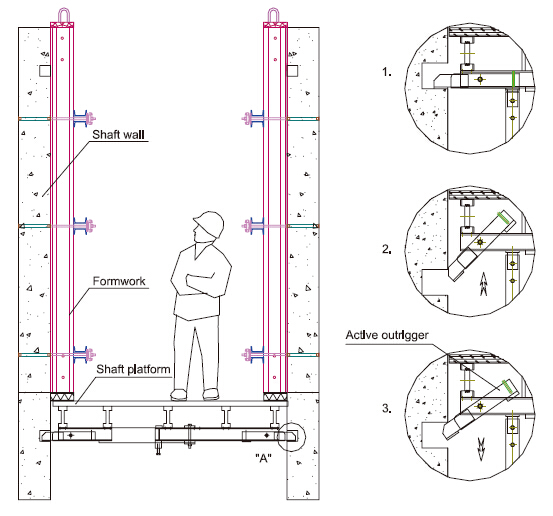
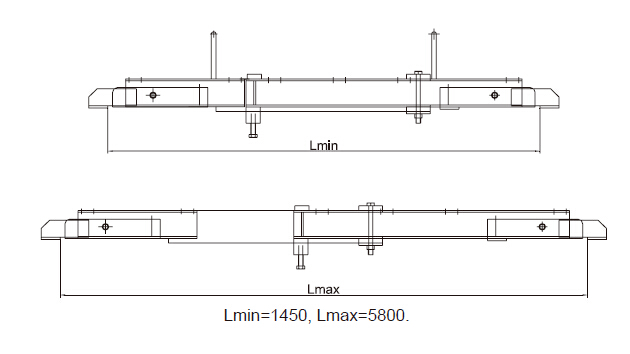
- Q:Can steel formwork be used in architectural concrete projects?
- Yes, steel formwork can be used in architectural concrete projects. Steel formwork offers several advantages such as durability, reusability, and the ability to create complex shapes and designs. It provides a smooth and consistent finish to the concrete surface, making it suitable for architectural applications where aesthetics are important. Additionally, steel formwork can withstand high pressure and load, allowing for the construction of large and structurally sound concrete elements.
- Q:Can steel formwork be used in high-rise construction projects?
- Yes, steel formwork can be used in high-rise construction projects. Steel formwork offers several advantages such as durability, strength, and the ability to withstand high concrete pressure. It provides a stable and efficient solution for constructing walls, slabs, and columns in high-rise buildings. Additionally, steel formwork can be easily customized and reused, making it a cost-effective choice for such projects.
- Q:Can steel formwork be used for decorative concrete finishes?
- Yes, steel formwork can be used for decorative concrete finishes. It provides sturdy support and precise shaping, allowing for intricate designs and smooth finishes in decorative concrete applications.
- Q:What are the different types of connectors used with steel formwork?
- There are several types of connectors commonly used with steel formwork, including wedge bolts, pin and wedge systems, clamps, and snap ties. These connectors are used to securely join the steel formwork panels together, ensuring stability and alignment during concrete pouring and curing processes.
- Q:Can steel formwork be used for both residential and industrial construction projects?
- Yes, steel formwork can be used for both residential and industrial construction projects. Steel formwork is a versatile and durable solution that can withstand the demands of various construction projects. It offers a high level of strength and stability, making it suitable for both small-scale residential projects and large-scale industrial projects. Additionally, steel formwork has the advantage of being reusable, which can help save costs and reduce waste in construction projects. It can be easily assembled and disassembled, making it a practical choice for different types of projects. Overall, steel formwork is a reliable and efficient option for both residential and industrial construction projects.
- Q:What are the different types of steel formwork supports?
- Construction projects commonly employ various types of steel formwork supports. The following are some notable examples: 1. Adjustable Steel Props: Vertical supports that allow for height adjustment. They consist of steel tubes with an inner and outer tube that can be adjusted effortlessly. These props are often utilized to support horizontal formwork or scaffolding systems. 2. Soldier Formwork System: This type of support involves vertical steel members known as soldiers, which are evenly spaced along the formwork. The soldiers are engineered to withstand the lateral pressure exerted by wet concrete and provide support to the formwork panels. 3. Trench Struts: Trench struts are employed to stabilize and support formwork in trenches or excavations. They comprise steel tubes with adjustable length and are typically used alongside steel walers or beams to establish a robust framework for the formwork. 4. H-Frame Systems: Vertical formwork supports often rely on H-frame systems. These systems consist of interconnected steel frames shaped like an "H" to create a stable structure. They are frequently employed to support vertical formwork panels or serve as a framework for climbing formwork systems. 5. Steel Waler: A horizontal member utilized to support formwork panels. Steel channels or beams are commonly employed to construct walers. They are used in conjunction with vertical supports such as adjustable steel props or trench struts. These examples illustrate the variety of steel formwork supports widely employed in construction. The choice of support system depends on specific project requirements, including formwork design, load capacity, and desired adjustability.
- Q:Can steel formwork be used for curved or irregular-shaped structures?
- Indeed, curved or irregular-shaped structures can be constructed using steel formwork. Unlike conventional timber formwork, steel formwork boasts enhanced flexibility and strength, rendering it ideal for intricate shapes and designs. With steel formwork, it is effortless to bend or fabricate it into any desired shape, facilitating the construction of curved walls, columns, and slabs. Furthermore, steel formwork delivers exceptional support and stability, guaranteeing the precision and accuracy of the eventual structure. Its durability and reusability further contribute to its cost-effectiveness in projects involving curved or irregular-shaped structures.
- Q:Can steel formwork be used for both interior and exterior concrete structures?
- Yes, steel formwork can be used for both interior and exterior concrete structures. Steel is a versatile material that offers exceptional strength and durability, making it suitable for various construction applications. When used as formwork, steel provides a rigid and stable framework that can withstand the pressure exerted by fresh concrete during pouring and curing. This makes it ideal for creating both interior and exterior concrete structures. Steel formwork is commonly used for constructing walls, columns, beams, slabs, and other structural elements in buildings and infrastructure projects. Its robustness allows it to withstand harsh weather conditions and other environmental factors, making it suitable for exterior structures. Additionally, steel formwork can be easily reused multiple times, which makes it a cost-effective choice for both interior and exterior projects. Furthermore, steel formwork offers flexibility in design and can be easily customized to meet specific project requirements. It can be easily assembled and disassembled, allowing for efficient construction processes. The smooth surface of steel formwork also produces high-quality finishes on concrete structures. However, it is important to note that steel formwork requires proper maintenance to ensure its longevity and prevent corrosion. Regular inspections, cleaning, and the application of protective coatings are necessary to maintain the integrity of the formwork. In conclusion, steel formwork is a versatile and reliable choice for both interior and exterior concrete structures. Its strength, durability, and flexibility make it suitable for a wide range of construction projects, providing efficient and high-quality results.
- Q:Can steel formwork be used for both horizontal and vertical structures?
- Steel formwork is capable of being utilized for both horizontal and vertical structures. This adaptable construction material can be effortlessly modified and recycled, rendering it appropriate for diverse kinds of structures. It offers exceptional robustness and stability, rendering it perfect for supporting substantial concrete loads in both horizontal and vertical implementations. Customizable and configurable, steel formwork systems can be assembled to meet the distinct needs of distinct construction ventures, facilitating efficient and precise construction of horizontal slabs and vertical walls. Its durability and resistance to deterioration establish it as a dependable option for long-lasting utilization in an array of construction applications.
- Q:Can steel formwork be used for tunnel portals?
- Yes, steel formwork can be used for tunnel portals. Steel formwork is known for its durability, strength, and flexibility, making it suitable for constructing tunnel portals. It can withstand the pressures and forces exerted during tunnel construction and provide a stable framework for pouring concrete. Additionally, steel formwork can be easily customized to meet specific design requirements, ensuring the tunnel portals are constructed accurately and efficiently.
1. Manufacturer Overview |
|
|---|---|
| Location | |
| Year Established | |
| Annual Output Value | |
| Main Markets | |
| Company Certifications | |
2. Manufacturer Certificates |
|
|---|---|
| a) Certification Name | |
| Range | |
| Reference | |
| Validity Period | |
3. Manufacturer Capability |
|
|---|---|
| a)Trade Capacity | |
| Nearest Port | |
| Export Percentage | |
| No.of Employees in Trade Department | |
| Language Spoken: | |
| b)Factory Information | |
| Factory Size: | |
| No. of Production Lines | |
| Contract Manufacturing | |
| Product Price Range | |
Send your message to us
Shaft Platform S40 System for Formwork and Scaffolding
- Loading Port:
- Tianjin
- Payment Terms:
- TT OR LC
- Min Order Qty:
- 50 m²
- Supply Capability:
- 1000 m²/month
OKorder Service Pledge
Quality Product, Order Online Tracking, Timely Delivery
OKorder Financial Service
Credit Rating, Credit Services, Credit Purchasing
Similar products
New products
Hot products
Related keywords
